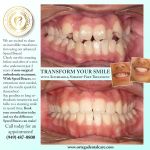When it comes to maintaining good oral health, your diet plays a crucial role. The foods you eat can either support or harm your dental health, so it’s important to make mindful choices that promote strong, healthy teeth. This article will explore the best foods for improving dental health, from strengthening enamel to preventing gum disease. Whether you’re looking to improve your smile or protect against cavities, this guide will provide you with practical, food-based tips for keeping your teeth in tip-top shape.
- 1. Calcium-Rich Foods for Strong Teeth
- 2. Crunchy Vegetables and Fruits for Natural Cleaning
- 3. Foods High in Vitamin C for Gum Health
- 4. Foods with Fluoride to Strengthen Enamel
- 5. Foods to Avoid for Better Dental Health
1. Calcium-Rich Foods for Strong Teeth
Calcium is one of the most important minerals for maintaining strong teeth and bones. It helps to build tooth enamel, the protective outer layer of the teeth, making it more resistant to cavities. Foods that are rich in calcium are essential for improving dental health and preventing tooth decay.
Some of the best sources of calcium include dairy products like milk, yogurt, and cheese. If you’re lactose intolerant or prefer plant-based options, calcium-fortified plant milks, tofu, and leafy green vegetables like kale and broccoli are also great alternatives. By incorporating these foods into your diet, you can help strengthen your teeth and reduce the risk of dental issues like enamel erosion and bone loss.
2. Crunchy Vegetables and Fruits for Natural Cleaning
Not only do crunchy vegetables and fruits contribute essential vitamins and fiber to your diet, but they also help to naturally clean your teeth as you chew. Foods like apples, carrots, and celery act as natural toothbrushes, scrubbing plaque and food particles off your teeth and gums. This action helps to prevent the buildup of plaque, which can lead to gum disease and cavities.
In addition to their natural cleaning power, these foods also stimulate saliva production. Saliva is essential for neutralizing acids in the mouth and washing away bacteria that can contribute to tooth decay. So, eating crunchy foods not only benefits your teeth mechanically but also helps promote a healthy environment in your mouth.
3. Foods High in Vitamin C for Gum Health
Vitamin C is not only important for boosting your immune system, but it also plays a critical role in maintaining healthy gums. Gum disease, including gingivitis and periodontitis, is one of the most common dental problems, and vitamin C helps prevent these issues by strengthening the blood vessels and tissues in the gums. A deficiency in vitamin C can lead to bleeding gums, swollen tissues, and a higher susceptibility to infection.
To keep your gums in good health, include foods that are rich in vitamin C in your diet. Citrus fruits like oranges, grapefruits, and lemons are well-known sources, as well as strawberries, kiwi, and bell peppers. By consuming these foods regularly, you can maintain healthy, strong gums and reduce the risk of developing gum disease.
4. Foods with Fluoride to Strengthen Enamel
Fluoride is a mineral that helps to strengthen tooth enamel and prevent cavities by making the enamel more resistant to decay. While many people associate fluoride with toothpaste or water, certain foods also contain fluoride, which can contribute to your overall dental health.
Tea, particularly black and green tea, is one of the best natural sources of fluoride. Additionally, some fish, such as salmon and sardines, as well as certain vegetables like spinach, are good sources of this important mineral. Including these fluoride-rich foods in your diet can complement your oral hygiene routine by strengthening your enamel and protecting your teeth from decay.
5. Foods to Avoid for Better Dental Health
While focusing on the best foods for improving dental health is important, it’s equally essential to know which foods can harm your teeth. Some foods can lead to tooth decay, enamel erosion, and gum disease, so it’s best to limit their consumption. Sugary snacks, candies, and sodas are some of the most damaging culprits. These foods feed harmful bacteria in the mouth, which produce acids that break down enamel and lead to cavities.
Acidic foods, like citrus fruits, tomatoes, and vinegar, can also erode enamel over time. While these foods offer great nutritional benefits, it’s best to consume them in moderation and rinse your mouth with water afterward to minimize their impact on your enamel. Additionally, sticky foods like caramel and dried fruit can cling to your teeth and contribute to plaque buildup. Always remember to brush and floss after consuming these foods to maintain optimal dental health.
By making smarter food choices and avoiding these harmful items, you can protect your teeth from decay and maintain a bright, healthy smile for years to come.
If you’re looking to further improve your dental health, consider incorporating these best foods for improving dental health into your diet. And if you're interested in expert advice or treatments, visit Dentistry Toothtruth for more information on how to take care of your teeth.







 Central Park Dental Aesthetics4.0 (129 review)
Central Park Dental Aesthetics4.0 (129 review) Richard L. Shulman Dmd Pc5.0 (139 review)
Richard L. Shulman Dmd Pc5.0 (139 review) Dr. Leonard F. Anglis, DDS Implant & Restorative Dentistry5.0 (24 review)
Dr. Leonard F. Anglis, DDS Implant & Restorative Dentistry5.0 (24 review) Aurora Dental Care4.0 (153 review)
Aurora Dental Care4.0 (153 review) Ortega Dental Care4.0 (308 review)
Ortega Dental Care4.0 (308 review) Dr. Dov Kahane, DDS4.0 (6 review)
Dr. Dov Kahane, DDS4.0 (6 review) The Importance of Oral Health Education During Pregnancy for a Healthy Pregnancy
The Importance of Oral Health Education During Pregnancy for a Healthy Pregnancy Best Tips for Brushing Your Teeth Properly for Healthy Gums: Essential Techniques for Oral Health
Best Tips for Brushing Your Teeth Properly for Healthy Gums: Essential Techniques for Oral Health Why Skipping Dental Checkups Can Lead to Bigger Oral Health Problems
Why Skipping Dental Checkups Can Lead to Bigger Oral Health Problems Advantages of Porcelain Dental Restorations
Advantages of Porcelain Dental Restorations How Can Diabetes Cause Tooth and Gum Problems? Preventing and Managing Oral Health Issues
How Can Diabetes Cause Tooth and Gum Problems? Preventing and Managing Oral Health Issues Healthy Habits for Promoting Good Oral Health and Hygiene: Tips for a Healthy Smile
Healthy Habits for Promoting Good Oral Health and Hygiene: Tips for a Healthy Smile